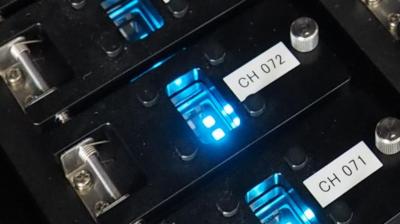TADF OLED emitters, introduction and market status - Page 5
Kyulux raises $34 million in its latest funding round, receives basic HF TADF patent from Kyushu University
TADF materials developer Kyulux announced that it has finalized its Series-B-prime funding round, raising $34.3 million USD from several VCs and companies. Kyulux will be able to now accelerate its product development and drive for adoption of its materials in smartphone OLED displays.

Kyulux also announced plans to establish a mass production system for its materials, in cooperation with chemical companies.
Densely-packaged dimer-enhanced MR-TADF emitters demonstrate high efficiency with a narrow emission spectrum
Researchers from Soochow University, in collaboration with a wide team of scientists from China and Japan (including Prof. Adachi from Kyushu University) developed a TADF emitter material compound that features high efficiency and a narrow color spectrum.

Up until now, most TADF emitters featured a wide spectrum, which limits the adoption of TADF materials in displays as they cannot enable a wide color spectrum. To overcome this problem companies employ a structure in which the TADF emitter is combined with a narrow-spectrum fluorescence emitter (so-called Hyperfluorescence).
Kyulux announces management changes
TADF OLED materials developer Kyulux announced a new CEO and President, to replace the current CEO Mr. Junji Adachi. Mr. Nakano will become the company's new CEO starting February 11, while Junji has been appointed as Chief Strategy Office. This is a part of a wide management change at Kyulux that reflects the company's transition from material development to commercialization.
Mr. Nakano has an impressive industry background in addition to management positions, and since 2014 he was an executive officer and manager director of Japan's Innovation Network (INCJ).
Cynora achieves breakthrough in its green TADF material, test kits are now available for display makers
OLED material developer Cynora announced that it achieved a breakthrough in its deep-green TADF material, which it brands as cyUltimateGreen. The new material delivers an efficiency of over 20% (EQE), a lifetime of 400 hours (LT95@15mA) and a color point and emission spectrum that matches today's DICI-P3 standard (Cynora does not specify the exact number).

Cynora further announced that is now making test kits of the new deep-green emitter available to its customers. Display makers can now start testing and verification using the new material. Cynora says it will also 'soon' follow with a deep-blue TADF solution.
Researchers at Osaka University developed an efficient heavy-metal free room-temperature phosphorescence OLED emitter
Researchers from Osaka University developed the best performing heavy-metal-free room-temperature phosphorescence (RTP) OLED emitters.

The researchers say that the new emitter (called SiAz), made entirely out of carbon, hydrogen, nitrogen, and silicon atoms, combines the mechanisms of TADF and RTP to create an efficient emitter system.
Kyushu University researchers developed a promising new two-unit stacked tandem Hyperfluorescence blue OLED emitter system
Researchers from Kyushu University reported that they have developed a promising new blue OLED emitter system, based on a two-unit stacked tandem hyperfluorescence OLED with improved singlet-excited-state energy transfer from a sky-blue assistant hetero-donor-type TADF (HDT-1) dopant.

The research reports that the new emitter system offers a pure-blue color (CIE 0.13, 0.16), a narrow spectrum (full-width at half-maximum of 19 nm), an EQE of 32% at 1,000 cd/m2 and a lifetime of 18 hours LT95. The lifetime is still lacking, but with stricter control of device fabrication and procedures the researchers say they expect that device lifetimes will further improve to rival commercial fluorescent blue OLEDs.
SK Materials and JNC join forces to produce OLED stack materials
Korea-based SK Materials has established an OLED materials joint venture with Japan's JNC. The two companies will establish a new company called SK JNC (in which SK will hold 51%) that will produce OLED stack materials, including emitters.
The materials in production will be based on JNC's technologies and patents, including ones for blue emitters - apparently the main patent is for a TADF blue emitter. SK will provide its production and sales network.
Researchers develop an efficient near-infrared TADF OLED device
Researchers from Canada's Polytechnique Montréal and the Université de Montréal developed a new near-infrared (840 nm) TADF OLED device that is 300% more efficient than existing ones. The IQE of the new deice is 3.8% - which is the best all-organic OLED emitter ever developed above 800 nm.

Photograph of the Polytechnique Montréal crest taken using visible and infrared illumination. Credit: Pr Sébastien Kéna-Cohen
To create the new OLED device, the researchers developed two new organic compounds - and were inspired by a class of molecules previously used for biomedical imaging.
Kyulux and Nippon Soda to co-develop intermediates for TADF emitters
TADF emitter developer Kyulux announced that has signed a joint-development agreement with Nippon Soda to develop new intermediates compounds for TADF emitters. The goal of this collaboration is to improve the performance and quality of Kyulux's TADF materials, and also dramatically improve the production efficiency of new compounds.

This agreement also markets Nippon Soda first entry into the OLED market. The company, founded in 1920, is highly environmentally conscious and has accumulated advanced organic material development capabilities and vast synthesis know-how, which will assist it in this new OLED project.
The 5th TADF Workshop to be held as an online live streaming event
Due to the global COVID-19 pandemic, the 5th annual International TADF Workshop and the 3rd i3-opera Forum, a companion event aimed at industry researchers, will be held on December 78 by means of online live streaming.

In the Workshop, novel scientific concepts will be discussed, as well as the future direction of TADF-OLEDs, perovskite LEDs, radical-based LEDs, QD-based LEDs, novel materials-based LEDs and more. In the Forum, the scope will be extended even further, to include topics ranging from TADF frontier science to interdisciplinary technologies for future lifestyle.
Pagination
- Previous page
- Page 5
- Next page


